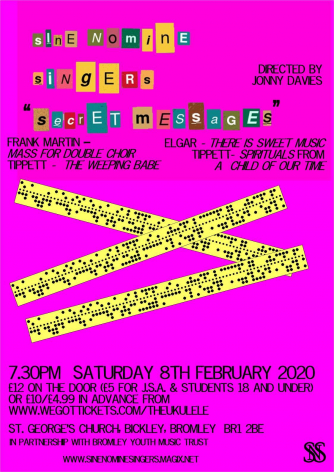Details
St George's Church
Bickley Park Road
Bickley
Bromley
London
BR1 2BE
England
Programme
Frank Martin – Mass for Double Choir
Michael Tippett – The Weeping Babe (1944)
Edward Elgar – There is Sweet Music, Op.53 no.1
Michael Tippett – A Child of our Time: Five Spirituals
Performers
Jonny Davies – Conductor
Sine Nomine Singers
Programme Note
Renowned chamber choir present a programme of music with hidden meanings. Frank Martin (1890-1970) wrote his stunning Mass for Double Choir in the 1920s, intending to keep it "an affair between God and himself." It remained a work of private devotion until its first performance in 1963.
Michael Tippett (1905-1998) began work on his oratorio, "A Child of Our Time" on the outbreak of the Second World War in 1939. The work as a whole is structured around five very well-known spirituals, such as "Steal Away" and "Nobody Knows", and we include these songs in our concert programme. Inspired by the events of Kristallnacht, Tippett used the music of one oppressed minority (those of African-American heritage) to express his empathy with another: the Jewish community in Germany suffering the events of November 1938. The arrangments are very British, but, as the conductor Mark Wigglesworth says, " the music transcends time and place to poignantly unite the two extremes of the human condition: desolation and hope."
"There is Sweet Music" is from Elgar's set of four songs, Opus 53, composed in 1907,and has a hidden twist. It is in two keys simultaneously, the men singing in G and the women in Ab. Elgar considered it to be ". . .a clinker and the best I have done." A setting of part of Tennyson's poem "The Lotos-Eaters", perhaps Elgar used bitonality to portray the disorientation that could ensue from consuming said "lotos"?
And we return to Tippett for "The Weeping Babe", a highly chromatic setting of a text by Edith Sitwell, written in 1944 for the BBC Singers.

 Your events at Classical Events
Your events at Classical Events

